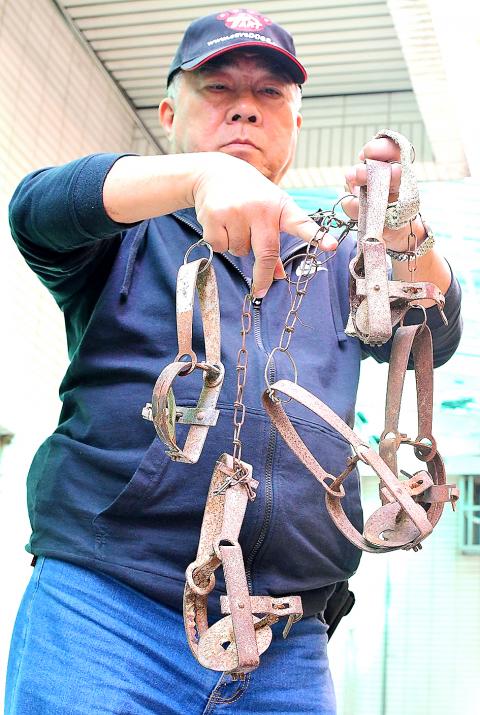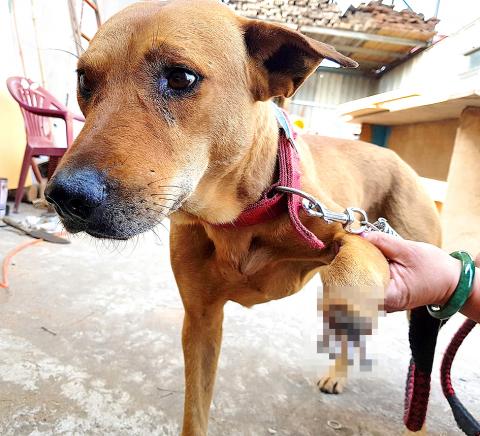Members of the Animal Rescue Team Taiwan are calling for better enforcement of laws prohibiting the use of animal traps, after three dogs in Kaohsiung lost their legs to the devices last week.
One of the injured dogs, which lost a front leg, was nursing a litter when it was found, the team said.
Laws should be amended to allow the city’s Animal Protection Office to more effectively seize traps to prevent a recurrence of such “heart-wrenching” incidents, they added.

Photo courtesy of Animal Rescue Team Taiwan
Last week, the team was called to rescue three dogs in the city’s Liouguei (六龜) and Tianliao (田寮) districts, and Singda Harbor (興達港), and rushed the dogs to surgery to save their lives, the team said.
Article 14-2 of the Animal Protection Act (動物保護法) prohibits the manufacture, sale, import, export and display of animal traps unless authorized by the central government.
The act was amended on June 29, 2011, because the authorities said the traps were a “cruel implement of slaughter and should forever disappear from Taiwan,” rescue team spokesperson Anthony Ni (倪京台) said.

Photo courtesy of Animal Rescue Team Taiwan
Despite the amendment, the number of cases handled by the team involving cats and dogs mutilated by traps has not dropped over the past seven years, he said.
Only 10 percent of animals caught in traps have been saved, with a majority dying from sepsis, he said.
Protected animals also get caught in the traps, Ni said, citing reports of leopard cats and Formosan bears coming in contact with the devices.
Moreover the Animal Protection Act only prohibits the manufacture, sale, import, export and display of traps, but not ownership — a legal loophole that many people exploit, he said.
“Faced with the threat of their traps being seized, some people simply tell authorities that they had bought the traps long ago and that they are only keeping them in storage,” he said.
In 2016, the Kaohsiung City Government was the first in the nation to introduce a municipal ordinance that closed this loophole by banning ownership of traps, he said.
City authorities informed the local hardware association about the ordinance and conducted random inspections of association members, he said.
However, the law is difficult to enforce in remote mountain communities, he said.
Every year the Kaohsiung Animal Protection Office offers free vaccination shots for rabies and other diseases to pet owners in remote rural communities.
In the process of administering vaccines it usually encounters pets with severed limbs, which their owners say were caused by the pets running off into the mountains and forests, the office said.
“Some of the traps are made by people on their own. This is just something you cannot guard against,” Ni said.
The office cooperates with local government offices and civic animal protection groups to search for traps in the mountains, and posts signage along mountain trails to remind the public that traps are illegal, he said.
The Animal Protection Act stipulates that those found making, selling, importing, exporting or exhibiting traps may be fined up to NT$75,000 (US$2,436), while Kaohsiung’s municipal ordinance prohibiting trap ownership stipulates a fine of NT$15,000.
If the use of a trap results in the death or debilitation of an animal, the owner of the trap may be fined up to NT$2 million and face up to two years in prison, as stipulated in Article 25 of the act, Animal Protection Office director Yeh Kun-sung (葉坤松) said.

Beijing could eventually see a full amphibious invasion of Taiwan as the only "prudent" way to bring about unification, the US Department of Defense said in a newly released annual report to Congress. The Pentagon's "Annual Report to Congress: Military and Security Developments Involving the People's Republic of China 2025," was in many ways similar to last year’s report but reorganized the analysis of the options China has to take over Taiwan. Generally, according to the report, Chinese leaders view the People's Liberation Army's (PLA) capabilities for a Taiwan campaign as improving, but they remain uncertain about its readiness to successfully seize

Taiwan is getting a day off on Christmas for the first time in 25 years. The change comes after opposition parties passed a law earlier this year to add or restore five public holidays, including Constitution Day, which falls on today, Dec. 25. The day marks the 1947 adoption of the constitution of the Republic of China, as the government in Taipei is formally known. Back then the Chinese Nationalist Party (KMT) governed China from Nanjing. When the KMT, now an opposition party in Taiwan, passed the legislation on holidays, it said that they would help “commemorate the history of national development.” That

Taiwan has overtaken South Korea this year in per capita income for the first time in 23 years, IMF data showed. Per capita income is a nation’s GDP divided by the total population, used to compare average wealth levels across countries. Taiwan also beat Japan this year on per capita income, after surpassing it for the first time last year, US magazine Newsweek reported yesterday. Across Asia, Taiwan ranked fourth for per capita income at US$37,827 this year due to sustained economic growth, the report said. In the top three spots were Singapore, Macau and Hong Kong, it said. South

Snow fell on Yushan (Jade Mountain, 玉山) yesterday morning as a continental cold air mass sent temperatures below freezing on Taiwan’s tallest peak, the Central Weather Administration (CWA) said. Snowflakes were seen on Yushan’s north peak from 6:28am to 6:38am, but they did not fully cover the ground and no accumulation was recorded, the CWA said. As of 7:42am, the lowest temperature recorded across Taiwan was minus-5.5°C at Yushan’s Fengkou observatory and minus-4.7°C at the Yushan observatory, CWA data showed. On Hehuanshan (合歡山) in Nantou County, a low of 1.3°C was recorded at 6:39pm, when ice pellets fell at Songsyue Lodge (松雪樓), a